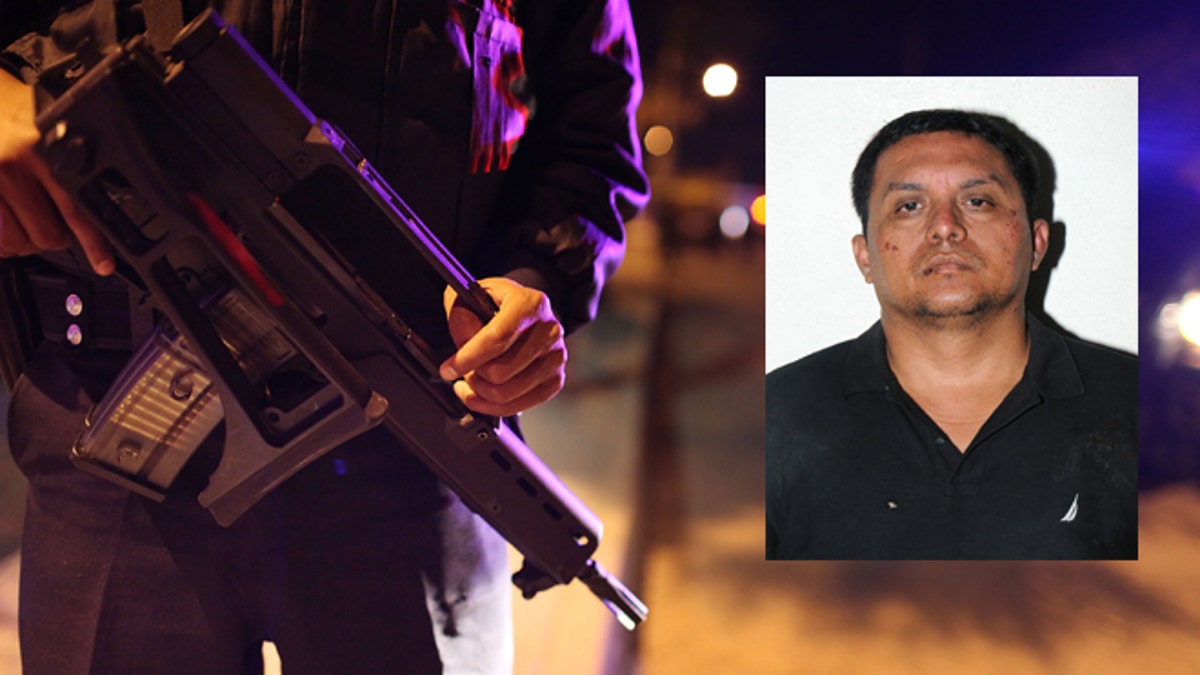
JUAREZ, MEXICO - MARCH 25: Police stand near the car where the body of a 13 year old boy lies dead, one of numerous murders over a 24 hour period, on March 25, 2010 in Juarez, Mexico. Secretary of State Hillary Rodham Clinton, Defense Secretary Robert Gates, and Homeland Security Secretary Janet Napolitano all visited Mexico on March 23 for discussions centered on Mexico's endemic drug-related violence. The border city of Juarez, Mexico has been racked by violent drug related crime recently and has quickly become one of the most dangerous cities in the world to live. As drug cartels have been fighting over ever lucrative drug corridors along the United States border, the murder rate in Juarez has risen to 173 slayings for every 100,000 residents. President Felipe Calderon's strategy of sending 7000 troops to Juarez has not mitigated the situation. With a population of 1.3 million, 2,600 people died in drug-related violence last year and 500 so far this year, including two Americans recently who worked for the U.S. Consulate and were killed as they returned from a children's party. (Photo by Spencer Platt/Getty Images) (2010 Getty Images)
The capture of Zetas drug cartel leader Miguel Angel Treviño Morales on Monday has been labeled as “possibly the biggest capture in the past few years” of any of Mexico’s notorious organized crime leaders.
It has also drawn speculation over what the future looks like for one of Mexico’s most violent drug trafficking organization.
Treviño's relatively peaceful capture by Mexican Marines on a remote road near the border city of Nuevo Laredo -- across from Laredo, Texas -- is another sign that Mexico’s second most powerful drug cartel is fragmenting and loosing grasp on its power, experts said.
“The Zetas are in for some tough times,” George Grayson, an expert on Mexico’s drug war at the College of William & Mary, told Fox News Latino.
The arrest is just the latest in a series of arrests, killings and setbacks that have authorities and rivals closing in on the Zetas.Both U.S. and Mexican officials have been closely investigating the cartel and they have been locked in bloody battles with their former bosses, the Gulf Cartel, and Mexico’s most powerful cartel, Joaquín “El Chapo” Guzmán’s Sinaloa Cartel.
“The big winner here is the Sinaloa Cartel,” said Grayson. “This should bolster their change of securing territory in Nuevo Laredo and other regions.”
Treviño's capture is also a major coup for the government of President Enrique Peña Nieto, who preached during his presidential campaign last year and during his nascent presidency that he was more concerned about reducing violence than about capturing major cartel members.
The so-called “kingpin” approach to the drug war was implemented by former Mexican President Felipe Calderón and has been blamed by many critics as the reason for the escalating body count in the conflict. Since 2006, when Calderón declared war on the drug cartels, an estimated 70,000 people have been killed.
Calderón’s approach had been championed by both the U.S. government and law enforcement agencies working with their counterparts in Mexico to combat drug trafficking.
Despite working with Mexico on numerous counter-narcotics efforts, U.S. federal law enforcement agencies – including the Drug Enforcement Agency (DEA) – denied any involvement in the capture of Treviño despite speculation that U.S. intelligence agents were involved.
“We had nothing to do with this. This is just kudos to the government of Mexico for doing an excellent job,” DEA spokesperson Barbara Carreno told Fox News Latino when questioned about U.S. involvement.
While experts argue that this capture won’t immediately curtail the mayhem, it could help give authorities a better grasp on what challenges remain.
“Over the medium to long term it could reduce the violence,” said Shannon O’Neil, a senior fellow at the Council on Foreign Relations. “Treviño was by all accounts a very violent man who oversaw the massacre of many Central American migrants.”
But it would be short-sighted to think his arrest will have a big impact on the multi-billion drug trafficking trade.
O’Neil argued that the capture will not have much of an effect on the flow of illicit substance across the border into the U.S. Unlike the Sinaloa and Gulf cartels, the Zetas don’t rely as heavily on the drug trade to fund their enterprise as their rivals and instead focus on more in-country crime trades such as kidnapping, extortion and immigrant smuggling.
“I don’t see a huge change in the drug market because of this capture,” O’Neil said. “If there is any change at all it will be in the domestic organized crime in Mexico, especially in regards to extortion.”
